YKAN Holds Training on Handling Caught and Stranded Marine Mammals on Bengkalis Island
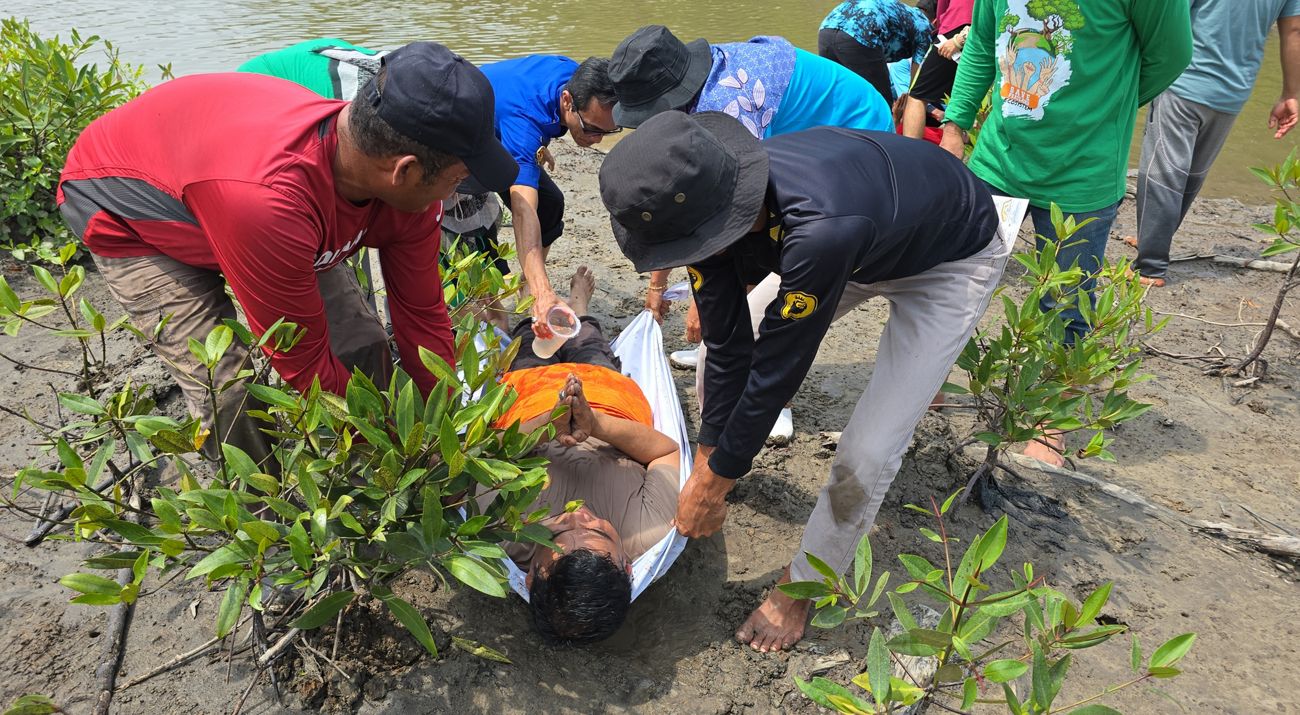
Media Contacts
-
A Yoseph Wihartono
MERA Communication and Reporting Staff
Yayasan Konservasi Alam Nusantara
Email: a.wihartono@ykan.or.id
Yayasan Konservasi Alam Nusantara(YKAN) held a "Training on Handling Caught and Stranded Marine Mammals" on August 6-7, 2024, in Kembung Luar Village, Bantan District, Bengkalis Regency, Riau Province. The training aimed to educate coastal communities on responding properly when encountering marine mammals.
Of the 128 species of marine mammals on Earth, 35 live around the Nusantara archipelago. All these marine mammal species have been classified as protected animals due to their increasing vulnerability to human activities and environmental degradation.
Bengkalis Island is home to at least three marine mammals, including dolphins, Irrawaddy dolphins, and dugongs. Local fishermen sometimes sighted these species.
However, encounters between humans and these marine mammals sometimes need to be handled with sufficient knowledge. Such encounters usually occur when marine mammals get caught in fishing nets or stranded on the shore.
According to some local fishermen, efforts are sometimes made to save stranded marine mammals if they are still alive. However, if the animals do not survive, they may be consumed. Some coastal communities still believe that parts of marine mammals' bodies have health benefits despite the lack of scientific evidence supporting this belief. This occurs because coastal communities still need to be equipped with knowledge about marine mammals and how to handle them.
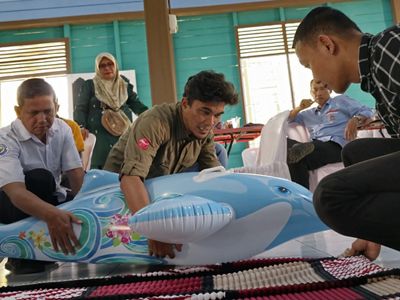
Rahmat Hidayat, a Coastal and Marine Ecosystem Manager from the Coastal and Marine Resource Management Agency (BPSPL) Padang, explained, "Humans should not consume marine mammal meat. These marine mammals may carry diseases that could be transmitted to other mammals if consumed."
Such incidents have occurred several times in YKAN's mangrove restoration area in collaboration with the community of Teluk Pambang Village on the eastern coast of Bengkalis Island. Rahmat explained, "Marine mammals indirectly benefit from mangrove forests. Mangrove forests are breeding grounds for fish, which then become part of the marine mammal food chain."
Therefore, YKAN needs to educate coastal communities on how to handle marine mammals. "Bengkalis has a unique ecosystem, not only with mangroves but also with marine mammals. Sometimes, these creatures are found where they are caught or stranded. Since marine mammals are protected species, we want to learn with the coastal communities of Bengkalis how to rescue caught and stranded marine mammals," said Mariski Nirwan, YKAN's Senior Coastal Resilience Manager.
The "Training on Handling Caught and Stranded Marine Mammals" event occurred on August 6-7, 2024, in Kembung Luar Village, Bantan District. It was attended by 30 participants from six villages on the eastern coast of Bengkalis Island, namely Teluk Lancar, Kembung Baru, Teluk Pambang, Pambang Pesisir, and Muntai.
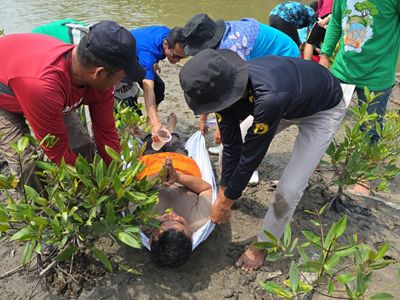
During the training, YKAN collaborated with BPSPL Padang. BPSPL Padang provided instruction through classroom material and field practice. The classroom material included a pre-test, an introduction to marine mammals, regulations, handling of marine mammals in various conditions, a field simulation of marine mammal handling conducted on the beach, documentation techniques, and a post-test.
The participants positively received the activity. The understanding provided by BPSPL Padang on the first day prompted a participant to collect dugong body parts at his home and hand them over to the authorities. The participant, Hamdan, handed over dugong bones and fins to BPSPL Padang and apologized for his ignorance.
"After receiving guidance from YKAN and BPSPL Padang, we express our regret and acknowledge our mistakes. We unintentionally caused the death of a dugong. At this moment, we are handing over the collection [of dugong parts] we have kept. We also urge our friends, especially in Bengkalis and across Indonesia, not to collect, capture, or destroy the habitat of protected animals," said Hamdan, a fisherman from Teluk Pambang Village.
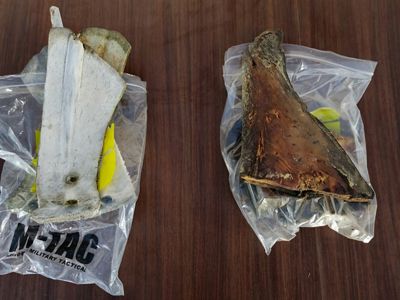
The prohibition against storing parts of protected animals' bodies is regulated under Article 21 paragraph (2) of Law No. 5 of 1990 concerning the Conservation of Living Natural Resources and Their Ecosystems ("Law 5/1990"), which prohibits the trade, storage, or possession of the body or parts of protected animals.
Rahmat Hidayat, a facilitator from BPSPL Padang, responded, "This is an important moment for us, as the protection and preservation of marine mammals is the responsibility of all parties, including the community, the central government, and local governments. Hopefully, this awareness can spread to others."
The participant's confession is commendable. It shows that coastal communities can positively receive well-delivered education. Therefore, such education may need to be conducted in more locations where marine mammals are stranded or caught.
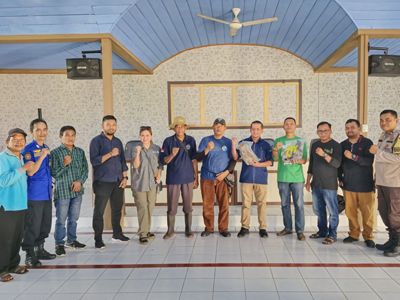
Mariski Nirwan expressed, "Honestly, I did not expect this (the handing over of dugong bones and fins). I am very moved that the people here have become more aware and are correcting their previous ignorance."
Sekar Mira, a Marine Mammal Researcher from the National Research and Innovation Agency's Oceanography Research Center (BRIN), explained that handling stranded mammals is an important issue that needs to be addressed. "Stranding events can potentially cause environmental disturbances, such as odor pollution and disease transmission through animals (zoonosis). In addition, stranding events indicate disturbances in our aquatic ecosystems. Marine mammals are sentinel species whose presence can serve as a safeguard for the health of aquatic environments. What disturbs their health in the waters also affects us humans. Through necropsies (or examination of carcasses), we can identify environmental disturbances that may have caused the marine mammals' death. These could indicate interactions with fishing gear that is not marine mammal-friendly, as well as physical or chemical pollution of the waters."
Yayasan Konservasi Alam Nusantara (YKAN) is a scientific-based non-profit organization that has been present in Indonesia since 2014. With the mission of protecting lands and waters as life support systems, we provide innovative solutions to realize the harmony of nature and humans through effective natural resource management, prioritizing a non-confrontational approach, and building a network of partnerships with all stakeholders for a sustainable Indonesia. For more information, visit ykan.or.id.



